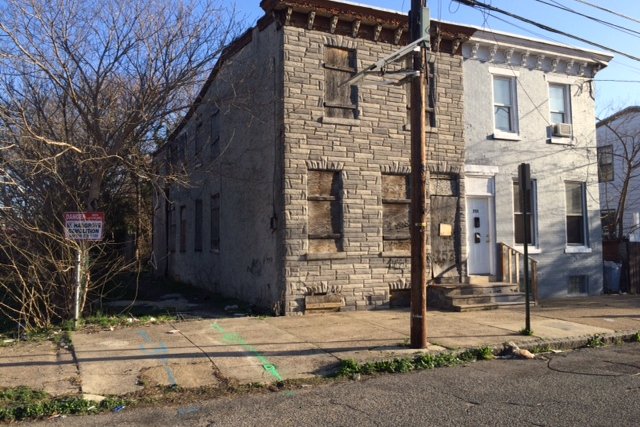
February 26, 2018
 KEVIN C. SHELLY/File/PHILLYVOICE
KEVIN C. SHELLY/File/PHILLYVOICE
The row home at 753 Walnut St. in Camden, seen in 2017, continues to deteriorate. Civil rights leader Martin Luther King Jr. used the address to file a police complaint when a white tavern owner in Maple Shade refused to serve him and three companions in 1950.
Martin Luther King Jr. did not live in Camden during his theology studies in the area, according to a woman who lived in the home.
He was a frequent visitor, however, and even stayed over nights at the house at 735 Walnut St., she said.
“He wasn’t a full-time resident. He was a part-time resident. He was there on the weekends,” Thelma Lowery, 85, said without hesitation Monday.
She is neither a bureaucrat charged with deciding the home’s historical significance, nor an advocate who has championed the home’s significance in King’s development as a civil right advocate.
As well as a former resident of the home that King visited from a Chester, Pennsylvania seminary college on weekends, Lowery owns the other side of the attached home, which came to her from her father, the late Benjamin Hunt.
So, she has a clear interest in seeing the empty home preserved. But she emphatically said several times on Monday that King was not a resident of 735.
“It is hard to make it a historic house. And who would come there for a tour?” she asked, noting the condition of the surrounding neighborhood. “Be for real!”
Lowery lived in the home for 22 years, including the primary year in question, 1950, when King apparently was targeted in a racial incident at a Maple Shade café. Did that refusal of service for King and three companions, followed by the owner allegedly firing a .45 caliber handgun into the air outside – set him on a path toward civil rights activism?
Listing the Camden property as his residence, King filed a police complaint against the owner in June 1950 in a move that may be the civil rights leader's first documented attempt to confront and challenge racism. But the case was soon withdrawn when three witnesses declined to testify.
Lowry said she recalls talk of the incident by her father; one of three people with King that day was one of her relatives.
The owner of 735 Walnut, Lowery’s sister-in-law, Jeanette Lily M. Hunt, could not be reached for comment.
Patrick Duff, who has acted as an advocate and spokesman for Hall and the importance of her property, declined to provide a phone number for Hunt.
Meanwhile, the state, responding to a records request made Feb. 12 by a reporter working for PhillyVoice, sent out a copy of an investigational report which concluded King did not live at the property, but did visit.
The Department of Environmental Protection has had the contentious report from researchers with Stockton University since Dec. 12, but had said nothing about the document.
A DEP press officer emailed copies of the review to some journalists last week, even though there is still no formal position on the property by the state.
“It was appropriate that it be released,” said spokesman Larry Hajna, who still could not say when a formal determination would come from the state.
The review began more than two years ago.
Duff, the advocate for the property, dismissed the report as “garbage” and “intellectual dishonesty at its highest.” Hunt concurred, he said.
He said the review of historical records and the recollections of residents and family “only questions black people,” and he said the state’s Historic Preservation Office deeply underrepresents minorities among its employees.
A spokeswoman for Stockton declined comment.
Duff said he is taking Camden to court over its grant-making process.
He also claimed that Hunt is so disgusted by the process that she is moving to donate the property to her church, rather than continue to pursue the state-sanctioned historic preservation status.
He dismissed the state’s process as “a dog-and-pony show,” which has “left a bad taste.”
And he also dismissed the support of local political leaders. “I’m done with that.”
While there still is no formal answer from New Jersey’s Historical Preservation Office, the 178-page report found:
“King may reasonably be said to have ‘stayed’ or ‘visited’ 753 Walnut Street at certain points in time, but at no time could be said to have ‘lived’ there according to usual standards for establishing residency, i.e., tax records, voting records, census records, a property lease, a permanent mailing address…
“The paucity of concrete information about King’s potential Camden movements means that it ultimately comes down to speculation about whether he stayed a night, a week, a month, or on some regular or inconsistent basis,” the report concludes.
A spokesman for Camden Mayor Frank Moran said the state had tipped them to the report’s findings last week.
Vince Basara said the city “respects the report and the process” and remains ready to assist Hunt and provide historical markers.
Congressman Donald Norcross likewise pledged continuing support despite Duff’s kiss-off.
“This house remains an important part of Camden City’s history, even without this specific designation," he said. “It’s encouraging that the Camden County Historical Society will continue to work to preserve and protect this significant landmark.”